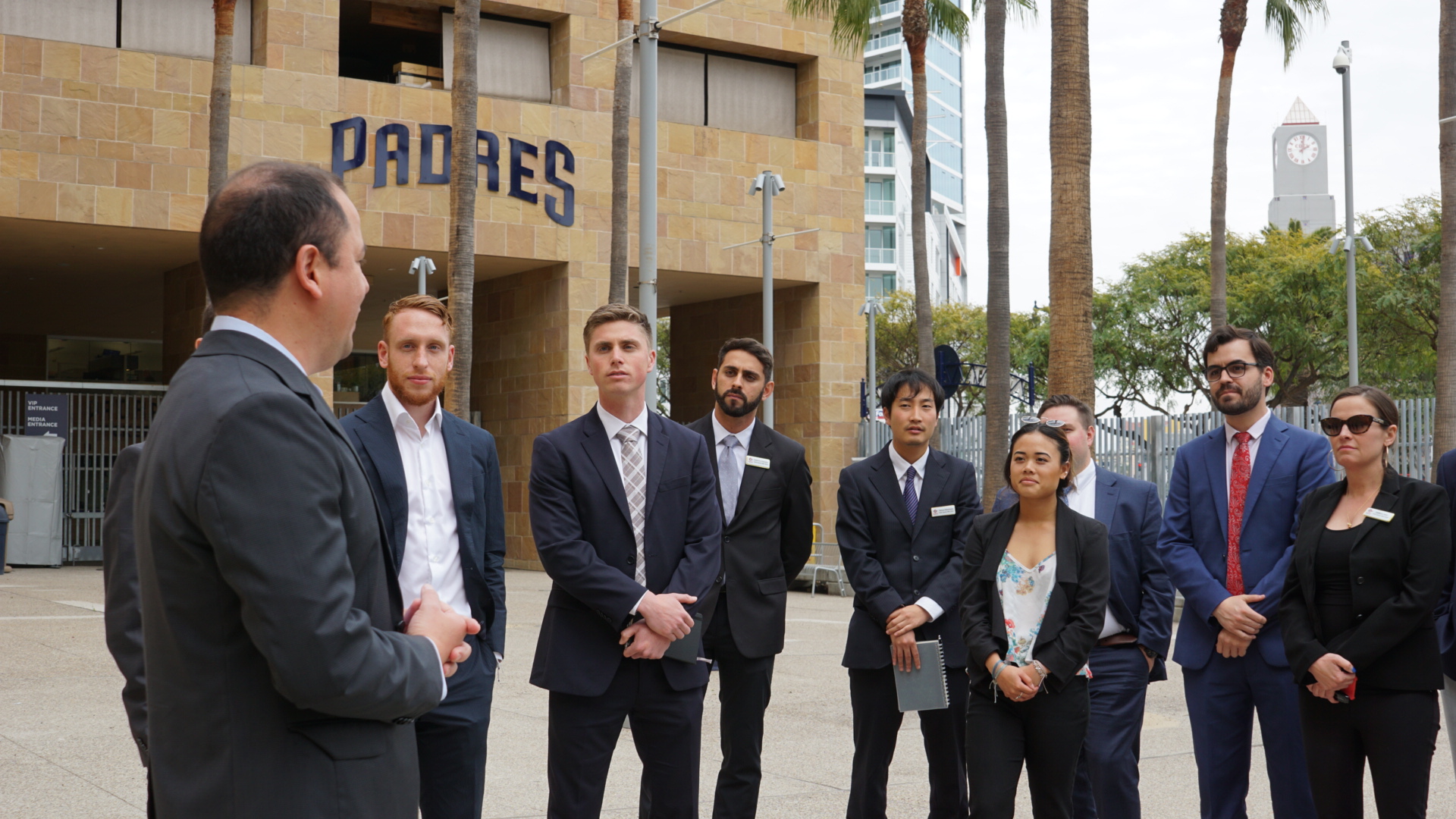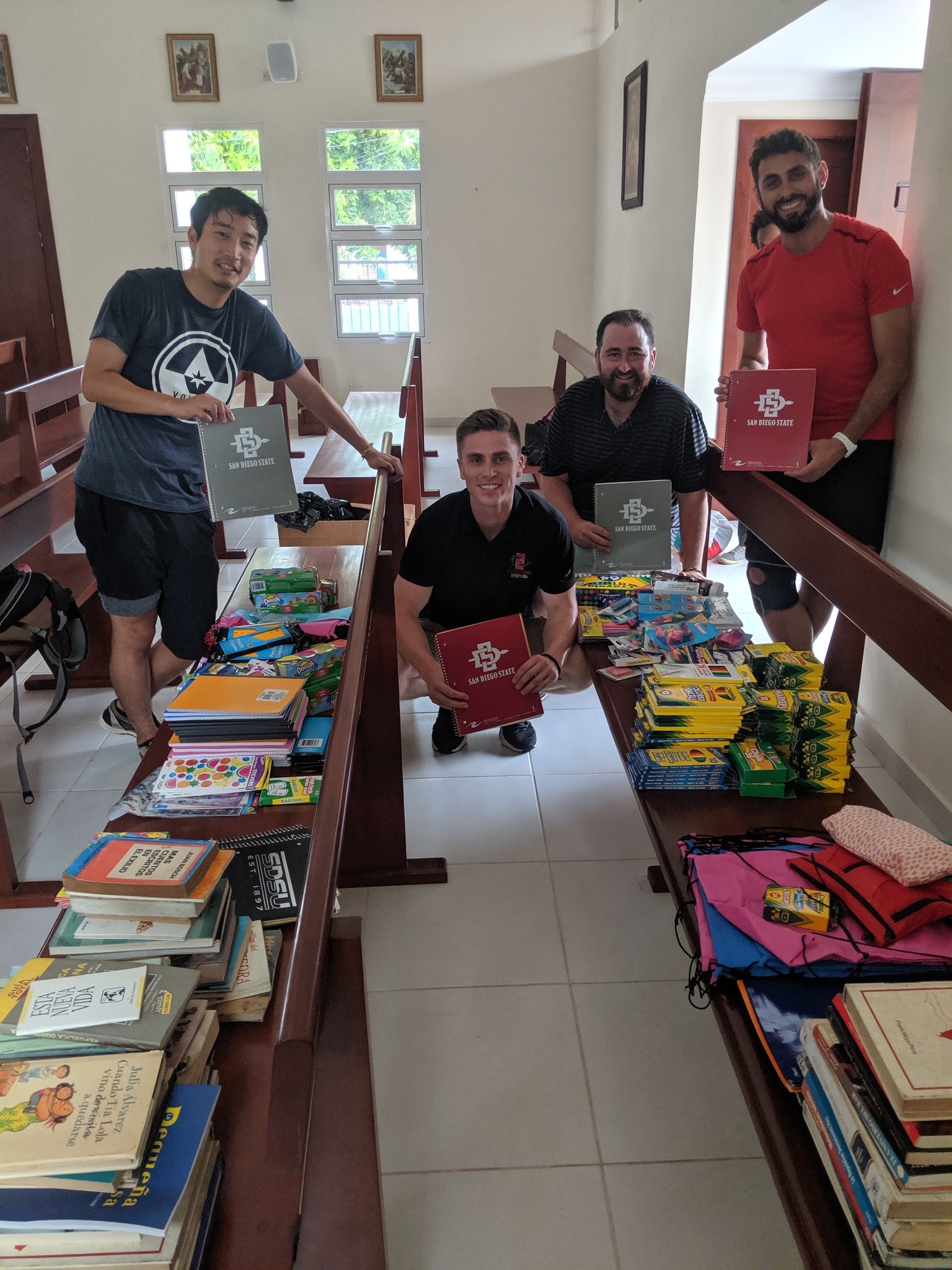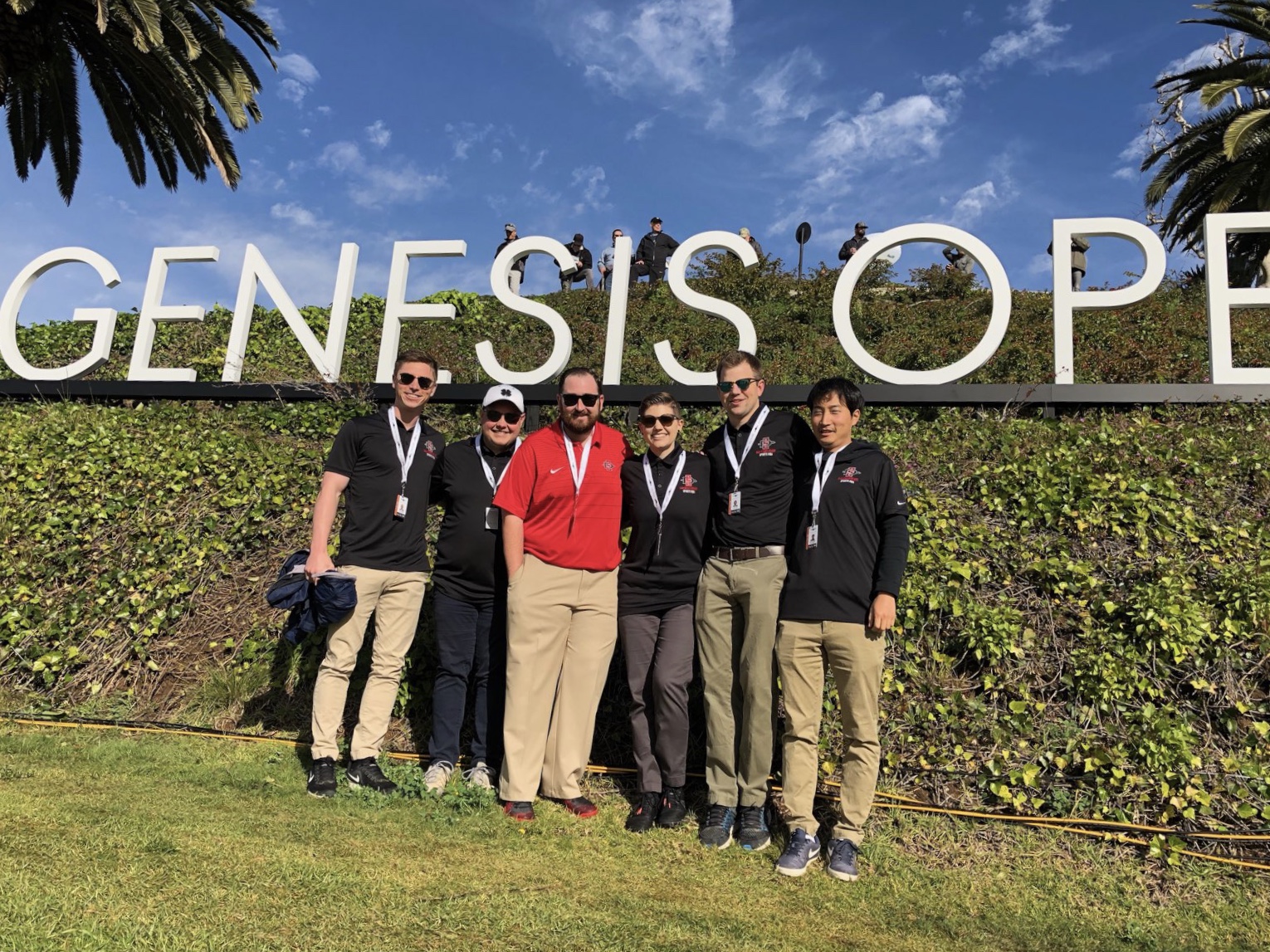SMBA 20 Graduate Q&A: Scott Patterson
At the end of May, the SDSU Sports MBA program within the Fowler College of Business held its virtual graduation celebration for the Class of 2020. Congratulations to the future sports business professionals in the graduating class!

Scott Patterson (third from left) listens with fellow classmates to Roberto Castro (SMBA '11) during a tour of Petco Park.
San Diego native, Scott Patterson chose the Sports MBA program because it aligned with his interests and he saw it as opportunity to help him drive a career change. He knew that the MBA curriculum would also provide a wider range of career opportunities and make him a competitive job candidate.
The SDSU Fowler News Team interviewed Patterson about his graduate school journey, the most influential courses from the program and how the skills he learned at SDSU helped him secure his current role as a Production Coordinator with San Diego-based performance apparel company, Vuori.
Q: Tell us a little bit about yourself, where are you from and where did you get your undergrad degree?
I grew up in San Diego. I received my undergrad degree from UC Santa Barbara.
Q: How/when you decided to pursue a Sports MBA degree at San Diego State?
I decided to pursue a Sports MBA degree as an opportunity for a career change to the sports industry. I was about a year removed from undergrad when I first discovered the Sports MBA program online. I’ve always wanted to pursue a graduate degree and this program aligned with my interests and priorities. It was an accelerated program based in my hometown, and it offered that opportunity to break into the sports industry. I also thought very highly about the fact the degree was an MBA with a focus in Sports Business as opposed to a Master’s in Sports Management. I felt that the MBA curriculum and degree would provide a wider range of career opportunities and make me a more competitive job candidate.

Scott Patterson (second from left) poses with donated SDSU school supplies during the program's international trip to the Dominican Republic.
Q: Do you have a favorite memory from your time within the Sports MBA program?
The Dominican Republic trip was definitely a highlight of the program for me. Though I’m not a huge baseball fan, I really enjoyed visiting the different MLB academies throughout the D.R. Also, we had the opportunity to meet some incredible people who are pushing for positive change within their communities and country, which I found very inspiring.
Q: What was your favorite class and/or favorite professor and why?
My favorite class was our Business Intelligence course taught by Dr. Kaveh Abhari. This course allowed us to explore different Business Intelligence tools. Whether or not members of the class were planning on pursuing a career related to Business Intelligence and Analytics, I think that it was very important for us to at least receive a baseline understanding of the various tools available and their general functionality. As technology and advanced software are further integrated into the sports industry, I think this course will only become more valuable to future Sports MBA students. Lastly, Dr. Abhari showed a true passion for the subject matter and administered the course in a manner that prioritized the students’ career development.
Q: The Sports MBA program is known for its industry guest speakers. Was there one or more that really stood out to you?
Shana Gritsavage Ferguson’s, Chief Commercial Officer at USA Swimming, seminar stood out to me since it covered various types of marketing within high-level sports organizations. Shana taught the seminar in a manner that invited constant discussion. She also spoke about the role that corporate social responsibility (CSR) plays within an organization’s business model and how we can all be leaders with regards to CSR no matter what positions we hold throughout our respective careers.
Q: The Sports MBA program is also known for its robust network of alumni. Are there program alumni from whom you remember getting good advice or who have really helped guide you or impacted your career?
Dom Lucq (SMBA ‘14) and Chris Clark (SMBA ‘12) were the two alumni who provided me the most guidance.
Dom Lucq, who works in Partnerships for the Golden State Warriors, interviewed me for admission to the program while I was living in San Francisco. We kept in contact periodically throughout the program and he even showed me around the Chase Center while it was still under construction. He gave me great advice relating to networking and was willing to connect me with people in his professional network for informational interviews.
I met with Chris Clark several times throughout the program, and I learned a lot from him about the action sports and sports apparel industries in Southern California. After I began to narrow my focus on a position within the sports/outdoor apparel industry, Chris was generous enough to introduce me to a contact of his who works at Vuori, a local performance apparel company with whom I later secured a full-time position.
Q: Why should others consider the Sports MBA program when looking at graduate programs?
The Sports MBA program provides a unique opportunity to be fully immersed in an MBA curriculum that is constantly integrated with the current sports business landscape. Even the core MBA courses such as Finance, Marketing, and Operations & Supply Chain Management use the sports industry when applying course concepts to real-world scenarios. The Sports MBA program has also fostered a strong alumni network that is very willing to give back to the program and provide guidance to the students.

Scott Patterson (left) poses with SMBA '20 classmates during the PGA TOUR's Genesis Open.
Q: Any advice you would have for current and/or future Sports MBA students about making the most of their time here?
Leverage your status as a graduate student to gain access to as many professionals within sports business as you can. Your time as a student is a rare opportunity to gain a solid understanding of the many different types of career options within sports business. It will make you a more knowledgeable person of the roles available and help narrow your focus as further your career.
Q: Describe your current position.
Vuori is a San Diego-based performance apparel company with products built for yoga, running, swimming, gym, outdoor, and leisure activities. Under my current role as Production Coordinator for Vuori, I coordinate the bulk production of our performance apparel products with our partnering suppliers. I am also responsible for facilitating the movement of the product from the factory of production to our company’s distribution center. The company is undergoing a major growth phase, which creates an exciting opportunity for me to hit the ground running in terms of both personal career development and company development.
Q: How did you acquire this position?
SDSU Sports MBA alumnus Chris Clark (SMBA ‘12), introduced me to the Sales Director at Vuori in the summer of 2019 while I was in the middle of the program. I was then able to connect with the Director of Operations, who was generous enough to allow me to help with a couple projects as a temporary intern. The Production Coordinator position then opened up at the beginning of 2020, and I was able to secure it through a series of interviews.
Q: Are there specific skills you learned through the Sports MBA program (in class or otherwise) that helped you with the role’s qualifications?
The Operations and Supply Chain Management course gave me a foundation for a lot of the things I do daily within my current role. Also, I was able to gain experience with Enterprise Resource Planning (ERP) software through the SDSU SAP ERP elective course. Vuori, along with most high-level apparel companies, have integrated ERP systems into their business models. The elective course taught me how to navigate the different types of functionality within an ERP system, and I could then highlight the certificate I earned through the course during the interview process.
Q: Any advice to future SMBA students who are looking to acquire a position similar to yours?
Reach out to people in the types of positions you might be interested in, and just start asking questions. Operations roles within the sports apparel industry can vary widely depending on which segment of the supply chain the position focuses on and the size of the company. Also, I have found that the professional network within the industry is very interconnected. You never know who someone might connect you with after you start the conversation.
Q: What is it that you are most looking forward to as you kick start this next chapter in your career?
I’m excited to be a part of a company that is growing so quickly while still relatively small in terms of the number of employees. It allows me to have a material impact on the success of the company, which is something that a lot of people don’t get the opportunity to do early in their career.
About the SDSU Sports MBA Program:
The SDSU Sports MBA program is an intensive, accelerated MBA degree focused on the dynamic business of international sports. The program provides its graduates a thorough understanding of the skills crucial for professionals to succeed, while building a broad network of relationships in the sports-rich landscape of Southern California. Visit business.sdsu.edu/sportsmba to learn more, request information or apply to the Sports MBA program.

